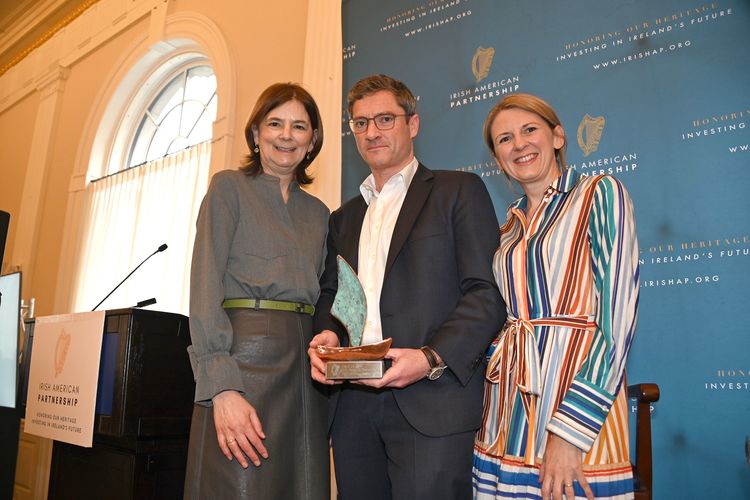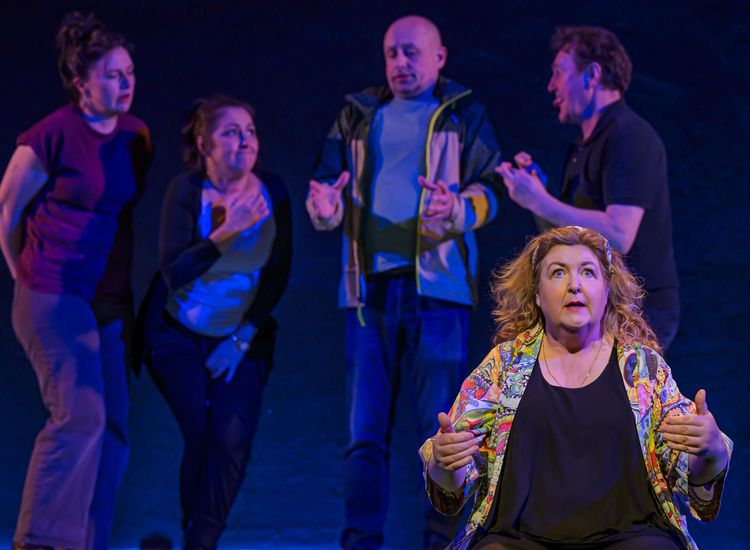By Peter McDermott
After lunch on a recent weekday, Sr. Mary Victor Waters returned to the baby blanket she was crocheting. It was for a grandnephew due to be born shortly in Ireland.
"I don't make them for sale," said the Franciscan nun who celebrated her 105th birthday on Sept. 14. "I wouldn't enjoy it. But I do enjoy making them for family and friends."
She had spent two weeks on the baby's gift. "I'm finishing it today," she said. Sr. Victor then planned to go on to the next order for a crocheted garment, a request from one of the 47 nuns she lives with in Tenafly, N.J.
She no longer takes on bigger projects. "She used to knit exquisite Aran sweaters," said Sr. Catherine Finnerty, the convent superior.
Sr. Victor learned to crochet and knit as a 6-year-old at home in Cornamona, Co. Galway. It was at her mother's knee, too, that another passion was nurtured. Together, parent and child loved to read magazine articles that described the life of missionaries in China. The young Mary Waters, the fifth of nine children, could not think of a better way to devote one's life.
"I thought I had a vocation all along, but I couldn't see myself entering in Ireland," she said. So, in 1925 when not yet 21, she set out for Chicago where two of her brothers lived.Her parents were divided about her plan. "My mother was delighted; my father was mad," Sr. Victor recalled. "He wanted me to come home. He didn't want me to stay out here at all."
She found work babysitting small children, which she liked.
"I was very lonely when I came out, but after a while, I had a lot of friends," Sr. Victor remembered. Then in 1928, she joined the Missionary Franciscan Sisters of the Immaculate Conception. The order was founded in 1873 in Belle Prairie, Minn., by Elizabeth Hayes, an Anglican convert and a native of the island of Guernsey. Hayes, later to become Sr. Mary Ignatius, dedicated her life to helping the poor.
Wartime posting
"I had a spiritual director, a Franciscan, and he told me what to expect," Sr. Victor recalled.
"I thought it would be far worse," she added, with a laugh. "But it wasn't. I was very happy." She remained so. "A lot left, but I never thought of leaving," she said.
Sr. Victor worked as a teacher in 4th and 5th grades, often in schools attached to Italian parishes around the United States. She noted that she always served in the North - in cities like Rockford, Ill., Chester, Pa. and Chicago.
There was a downside: teaching all the subjects took enormous concentration and too often there was little left for crocheting and knitting and the other pastimes she enjoyed.
In 1938, she was posted to the order's headquarters in Rome. War came the following year. "Getting in with the Germans wasn't good for the Italians; they were much happier with the Americans," she said. "But that was Mussolini's time. They had to follow.
"They had a lot of relatives here," she continued, "and for that reason alone, they loved America much more than any other country except their own."
Finally in 1942, the U.S. nuns were evacuated via Lisbon. "I was glad to get back," she remembered.
Sr. Victor made her first return trip to her homeland in 1950. Her father was still living. Her mother had died in 1933 before she took her final vows.
"Everything seemed different when I went back after 25 years. The houses seemed much smaller, because of the high buildings here," she said of Cornamona, which is in Irish-speaking north Connemara, bordering County Mayo.
Her main memory of childhood, she said, is "playing in the fields with all the kids," although staff at the convent reported that she still remembers knitting patterns from her earliest years.
"My father was a farmer, but a bad farmer. He didn't like farming," Sr. Victor said. "He drove the horse and cart. Whenever there was a funeral or anything, he was out -- he was gone."
He eventually changed his mind about her decision to join the convent and their relationship improved. "After my mother died, we became very good friends. He said he was glad," she said.
Her father died in 1951, just a few months after her return to America. He was 94.
Positive change
Sr. Victor, who thereafter went back regularly through her 100th year, didn't quite approve of Mass through the medium of Irish, though she granted that people come far and wide, even from Dublin, to hear her mother tongue spoken.
One reason she enjoyed a second stint back in Rome, beginning in 1971, was precisely because many Italians had learned English in the meantime. The people were also better off. Italy had seen in the 1960s one of the most remarkable transformations experienced by any country in modern times. Millions of people moved from rural poverty in the South to a thriving industrial economy in the North.
Asked what positive change she has seen over her lifetime, Sr. Victor said: "I think we have more freedom now than we ever had -- here, there and everywhere." As for negative change, she said: "We had more privacy in my time than we have now."
Sr. Victor never did get to China, or to Egypt, where some of her colleagues served. She maintained her strong ties to family in Ireland, however. One of her Chicago-based brothers died (as, earlier, did three of her siblings in childhood), while the other went back to Cornamona to take over the farm. He raised a large family there. A sister who'd spent time in the U.S. also returned to marry and raise a family. Several members of the next generation, though, came to America.
"They're very good to me," she said of family members on both sides of the Atlantic. "They come to see me every once and a while."
"There have been three loves of her life, three focuses: her God, her family and her community," said Sr. Catherine, who is a native of Ahascragh, Co. Galway.
"She definitely maintains a balance between her contemplative life and her active life," she said.
"I'm happy because everybody is so good to me," said Sr. Victor, the most senior member of a convent that caters to nuns who need some care and assistance.
"I'd be happy if the Lord called me tomorrow," she added. "It's all in His hands."
On the day the Echo visited, Sr. Laura joked that she'd reached the "age of social security." It was her 89th birthday. About 10 residents are on the cusp of the 90s, while another 10 are already there. Sr. Stella Therese, who was on phone duty on that day and who recently went to Staples to get more memory for her computer, is 95.
St. Victor could never do phone duty, as she is hard of hearing. But it is her only ailment. She has always had very good health, said Sr. Catherine. And though she doesn't like steps, she gets around easily with the help of a walker.
"She very much knows what she wants, and works to get it," said Sr. Catherine. "Maybe that's another secret of her longevity."
Some researchers believe that an optimistic disposition in youth serves a person well in later life. The 105-year-old County Galway native agreed that that profile fits her well. As a girl and young woman, she felt that the wider world had a lot to offer her.
"I wasn't disappointed," Sr. Victor said.










